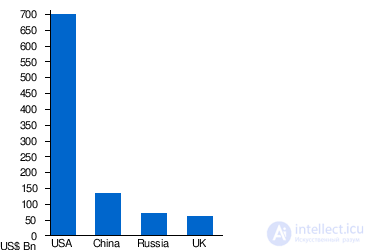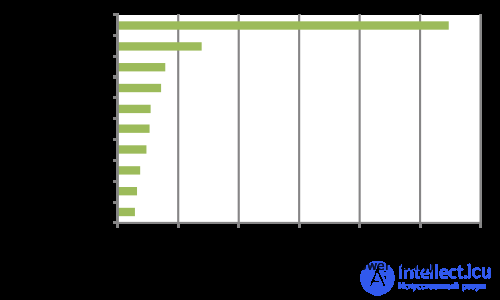A military economy is a branch of the state's economy, which, in a broad sense, covers all the economic issues of military affairs and provides for the defense (military) potential of the state. In addition, it is a science and academic discipline that studies the laws of economic support for military affairs in a state (defense, construction, maintenance of the armed forces, etc.), an integral part of military science. .

Seven major military budgets of the world in 2011.
The main source of SIPRI Yearbook 2012.

Military expenditures for 2007, for individual states.
Story
“Nothing is more dependent on economic conditions than the army and the fleet. Armament, composition, organization, tactics and strategy depend primarily on the current stage of production and on the means of communication. ”
- F. Engels
Many prominent statesmen were worried about the issues of the military economy , which emerged with the emergence of military affairs. In Russia, the first work on the problems of the military economy appeared in the XIX century. At the end of the 19th and the beginning of the 20th century, scientific papers on the interrelationship of the armed forces, military operations and the military economy in various states began to be published more actively.
Branch of the economy
The development of the military economy is inextricably linked with the general development of the state’s economic potential, its ability to function in conditions of military operations (war) and the needs of the armed forces in wartime and peacetime.
The military economy includes the creation of powerful branches of the defense (military) industry, increasing their production capabilities, the corresponding geographical location of defense (military) enterprises in the state, the establishment of sustainable economic and scientific-technical ties between them, the development of new technologies, the preparation of energy, the development of agriculture public health network, transport network, taking into account the provision of operations, protective measures for civil defense
The military economy is not separated from the civilian — a number of industries and enterprises produce both civilian and military products, or produce products that are consumed in both civilian and military sectors of the economy (dual-use products) (shoes, fabrics, clothing, food, transport and the like).
This is explained by the fact that the military economy both as an objective reality and how science develops in specific conditions. The specificity is that the military economy is, on the one hand, a part of the national economy, which is characterized by market relations with the regulation of relations taking place in it through supply and demand. On the other hand, it serves a system called the military organization of the state with its highly centralized control, the highest responsibility for the final results of operation - ensuring the military security of the state.
- Vikulov S.F. Problems of training military-scientific personnel // Independent Military Review, December 21, 2012.
Composition
Includes areas of production of various types of military products, their distribution, exchange and consumption: [ source not specified 1999 days ]
- production of means of production of military products (defense production);
- production of consumer goods, for people employed in defense production and for the personnel of the Armed Forces;
- production of final products (military equipment and weapons).
Component of military science
The military economy is an integral part of military science. It studies the relationship between military (combat) actions (armed conflicts, war) and the economy, questions of evaluation and comparison of the military-economic potentials of the opposing states (coalitions of states), the definition of forms and ways of mobilizing the preparation of the economy (national economy) if necessary, ensuring the effectiveness of the system of functioning of the military economy and the use of resources allocated to military purposes, and so on. [ source not specified 1999 days ]
The military economy as a science is a system of knowledge about economic processes and phenomena taking shape in various areas of the state’s defense activities. In this sense, the military economy is closely linked with economic and military science. The main subject of study of the science of military economics is the economic foundations:
- ensuring the defense and security of the state (country);
- ensuring the military-economic potential of the state (country);
- ensuring mobilization preparation of the economy (national economy) of the state (country);
- ensuring the performance of military duties and military service;
- ensuring cooperation in the military sphere;
- the relationship between war (armed conflict) and the economy;
The composition of the subject "Military Economy"
Exemplary:
- Basics of economic theory.
- Introduction to economic theory.
- The subject and method of economic theory.
- The main stages and directions of development of economic thought.
- The value of economic knowledge for officers.
- Forms of organization of economic activity.
- The main forms of management.
- The market, its role and functions in a mixed economy.
- Modern economic order.
- The problem of globalization and economic integration.
- Fundamentals of microeconomics.
- Fundamentals of the theory of supply and demand.
- Supply and demand in the market mechanism.
- The interaction of supply and demand.
- Price elasticity of supply and demand.
- Basics of consumer behavior.
- The usefulness and preferences of consumers.
- The optimal choice of the consumer.
- Firm in a market economy.
- Production and firm costs.
- The concept of production and production functions.
- Costs and profits of the company.
- Competition and monopoly in the market.
- Types of market structures. Firm in perfect competition.
- Firm under imperfect competition. Monopoly.
- Monopolistic competition and oligopoly.
- Labor market, wages and employment.
- Labor market, labor supply and demand, employment.
- Wages and its structure in the Russian economy.
- Capital market and land.
- Capital market, interest rate and investment.
- Land market and land rent.
- The economic role of the state.
- Market failures and economic goals of the state.
- The economic functions of the state and the tasks of the government.
- The basics of macroeconomics.
- National economy.
- Macroeconomics as an integral part of economic science.
- The main macroeconomic indicators.
- System of national accounts.
- Macroeconomic equilibrium.
- Consumption, savings and investment in the national economy.
- Macroeconomic model "income - expenses". Multiplier
- Aggregate demand and aggregate supply. Equilibrium in the commodity market.
- Money and monetary system.
- Money and money circulation.
- Money market. Equilibrium in the money market.
- Banking system and monetary policy.
- Inflation and its types.
- Financial system and fiscal policy.
- Finance. The state budget.
- Government spending and taxes.
- Financial market, its purpose and structure.
- Economic growth and its cycles.
- Theoretical foundations of economic growth and development.
- Economic growth and its types.
- Cyclical development of the economy.
- Elements of the world economy.
- International economic relations.
- World economy and world market
- Forms of economic cooperation in the world economy system
- International currency relations
- Transitional state and processes in national economies.
- The transition process in the economy of the Russian Federation (Russia).
- The essence and function of the transition state.
- Features of the transition processes in the Russian economy.
- Directions of structural reforms of the Russian economy.
- Transition and defense.
- The fundamentals of the military economy, the economic support of the state’s military power.
- The relationship of the military power of the state and the military economy.
- Military security as a component of the national security of Russia.
- Military power and military economic potential.
- Military economy in the structure of the national economy.
- The military-economic process and its effectiveness.
- The structure of the military-economic process.
- The effectiveness of military economic activity.
- Types and methods of military-economic analysis.
- The military market and features of its functioning.
- Military market in the structure of a mixed economy.
- Features of the internal military market.
- State defense order and military contracting system.
- World market for military products.
- Military economic policy of the states.
- Economic support for the state’s defense.
- The essence of economic security defense.
- Economic security defense - a factor of military security.
- Conversion of military production.
- Problems of economic mobilization.
- Financial support of military economic needs.
- The impact of economic instability on the satisfaction of military-economic needs.
- The federal budget as a source of military funding.
- Formation and use of the military budget.
- Financing national defense.
- Legal regulation of military economic activity.
- The legal status of the formations.
- Legal regime property formations.
- The theoretical basis of the management of the rear of the armed forces (AF) and other troops (forces) of the state.
- Economic features of the organization of the management system of the rear of the power structures of the state in the conditions of creating an interdepartmental unified logistic support system (MUSTO).
- The influence of economic and military-political conditions on the creation and functioning of the control system for the rear of the power structures of the state.
- Economy Logistics of the Armed Forces and other troops (forces) as a military-economic system.
- The rear of the Armed Forces and other troops (forces) as a military-economic system, its characteristic features.
- Economic laws, their operation and use in the area of the Logistics of the Armed Forces and other troops (forces).
- The work of the sphere of logistics of the Armed Forces and other troops (forces) and features of its product
- Modern methods of increasing the economic efficiency of the Logistics of the Armed Forces and other troops (forces).
see also
- Military-industrial complex
- Defense production
- List of countries for military spending


Comments
To leave a comment
Economic theories
Terms: Economic theories